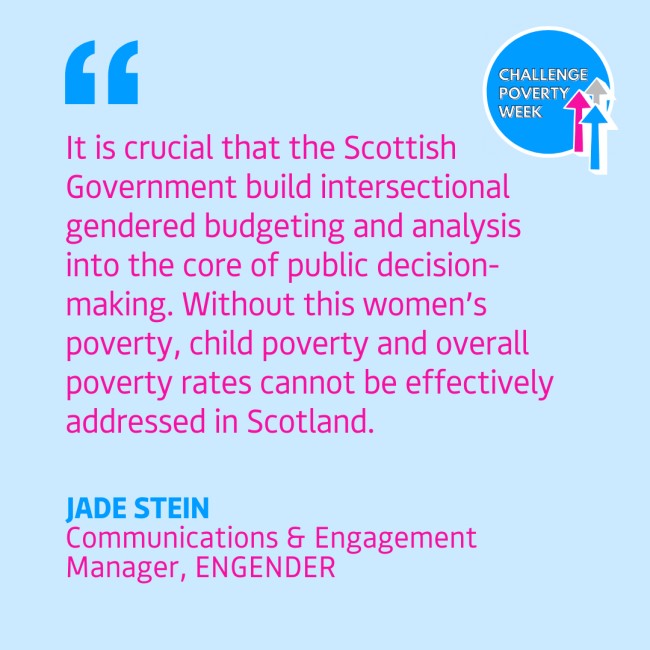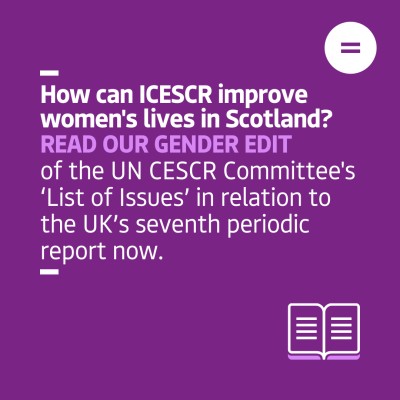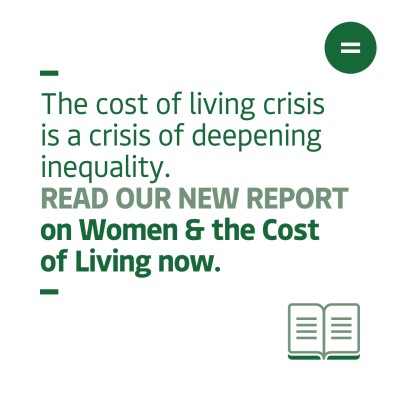Engender blog
The largest poverty indicator that no one's talking about
This week (2-7th October) marks Challenge Poverty Week, an annual campaign highlighting the injustice of poverty in Scotland, and to show that collective action based on justice and compassion can create solutions.
We know that women’s poverty is a result of long-standing, deep-rooted, and systemic fault lines in our society. In this blog, our Communications and Engagement Manager Jade Stein explores the need to make visible how poverty & economic inequality are experienced at higher rates by women & marginalised groups across our society.

Around one-fifth of Scotland’s people – more than a million of us – live in poverty. For a rich nation, with an abundance of resources, this is simply outrageous. 
Women's economic, social and cultural rights in Scotland

We recently submitted a shadow report, signed by 20 organisations, to the Seventh periodic report of the government of the United Kingdom on measures taken to give effect to ICESCR. In this blog, we share our gender edit of the List of Issues published by the CESCR Committee and take a look at some key issues raised.
The UN Committee on Economic Social and Cultural Rights is currently examining the UK on its performance under ICESCR (the International Covenant on Economic, Cultural, and Social rights). In 2022, the UK submitted its state party report (including input on devolved matters from Scottish Government), and the Committee received ‘shadow reports’ from civil society. Earlier this year we submitted a shadow report, co-signed by twenty organisations, which maps women’s rights in Scotland across the articles of ICESCR and highlights potential areas of focus for the Committee’s scrutiny. You can read more about our shadow report here.
Cost of Living Crisis: Gaps in support for women on low incomes in Scotland

As part of our blog series on the cost of living crisis, Laura Robertson from The Poverty Alliance talks about their recent report with the Scottish Women's Budget Group on the detrimental impacts on the lives of women living on low-incomes in Scotland caused by the crisis.
“I spoke to my friend who told me she has been starving and only eats at night. I have started doing that though it didn’t go well with me the first day, but I will get used to it.” (Idia, aged 35-44, lone mother and asylum seeker)
The cost of living crisis is having devastating impacts on people living on low incomes in Scotland. Research with 38 women affected by the cost of living crisis in Scotland published in November by the Poverty Alliance and the Scottish Women’s Budget Group reveals the devastating impacts on women living in a range of circumstances across Scotland. Our research found that women are facing deepening levels of poverty and hardship as they struggle to afford essentials. This blog examines gaps in support for women living on low incomes, reflecting on both the Autumn Statement and the Scottish Budget.
Delivering Equally Safe: Challenging and eradicating violence against women
-400.png)
To mark the annual 16 Days of Activism campaign, our Policy Officer for Engender's Delivering Equally Safe project, Hannah Brisbane, shares some background on our briefing for MSPs on the importance of primary prevention in challenging and eradicating men's violence against women.
We are currently in the middle of the 16 Days of Activism against Gender-Based Violence. This annual campaign runs from the International Day for the Elimination of Violence against Women on the 25th of November until the 10th of December, which is Human Rights Day.
The cost of living crisis and women: read our new report

Today Engender has released a report setting out how the deepening cost of living crisis will have a devastating impact both on different groups of women in Scotland, and on women's equality as a whole. Covering issues including fuel costs, unpaid care, housing, women's safety, mental health and social security, the report details how marginalised women will be disproportionately affected by this latest cost of living crisis. We make recommendations for immediate action to ensure that Scottish Government policy and budgetary responses to the cost of living do not risk entrenching gender inequality even more deeply in Scotland.
Crisis after Crisis, women pay the price
Women, particularly those facing intersecting marginalisation, pay the price in times of crisis because there is very little safety net when the fault lines of deep inequality in the UK are exposed. This is largely due to of a gendered ‘crisis of incomes’ across the UK that ensures women do not have equal access to financial resources compared with men. The egregious impact of the Covid-19 pandemic has already placed women at greater risk of economic insecurity, and the current cost of living crisis will further exacerbate women’s existing economic inequality, pushing many into poverty.
Higher prices, lower income, less security
While many people across Scotland are experiencing hardship as a result of the cost of living increases, women are far more likely to take responsibility for spending on children and purchasing non-durable items like food and domestic products that are susceptible to price hikes during periods of inflation. Alongside these increased costs, the UK Government decision not to uprate Universal Credit in line with inflation mean that hundreds of thousands of people in Scotland will experience a real terms income cut of £570 per year. Households impacted by the benefits cap face even more severe losses. Women are the majority of those on Universal Credit and impacted by the benefit cap.
Women make up the majority of many groups with high energy needs, including older people, disabled people, unpaid carers, and those looking after children in the home, and are also the majority of those in temporary work and on zero-hours contacts in Scotland. Soaring energy bills for households and business will therefore have a disproportionate impact on women, both as the managers of increasingly tight household budgets, and as those first in line to face unemployment, underemployment or the negative mental health impacts associated with precarious work.
Downloads
 Engender Briefing: Pension Credit Entitlement Changes
From 15 May 2019, new changes will be introduced which will require couples where one partner has reached state pension age and one has not (‘mixed age couples’) to claim universal credit (UC) instead of Pension Credit.
Engender Briefing: Pension Credit Entitlement Changes
From 15 May 2019, new changes will be introduced which will require couples where one partner has reached state pension age and one has not (‘mixed age couples’) to claim universal credit (UC) instead of Pension Credit.
 Engender Parliamentary Briefing: Condemnation of Misogyny, Racism, Harassment and Sexism
Engender welcomes this Scottish Parliament Debate on Condemnation of Misogyny, Racism, Harassment and Sexism and the opportunity to raise awareness of the ways in which women in Scotland’s inequality contributes to gender-based violence.
Engender Parliamentary Briefing: Condemnation of Misogyny, Racism, Harassment and Sexism
Engender welcomes this Scottish Parliament Debate on Condemnation of Misogyny, Racism, Harassment and Sexism and the opportunity to raise awareness of the ways in which women in Scotland’s inequality contributes to gender-based violence.
 Gender Matters in Social Security: Individual Payments of Universal Credit
A paper calling on the Scottish Government to automatically split payments of Universal Credit between couples, once this power is devolved to the Scottish Parliament.
Gender Matters in Social Security: Individual Payments of Universal Credit
A paper calling on the Scottish Government to automatically split payments of Universal Credit between couples, once this power is devolved to the Scottish Parliament.
 Gender Matters Manifesto: Twenty for 2016
This manifesto sets out measures that, with political will, can be taken over the next parliamentary term in pursuit of these goals.
Gender Matters Manifesto: Twenty for 2016
This manifesto sets out measures that, with political will, can be taken over the next parliamentary term in pursuit of these goals.
 Scottish NGO Briefing for UN Special Rapporteur on Violence Against Women
Joint briefing paper for the UN Rapporteur on Violence Against Women.
Scottish NGO Briefing for UN Special Rapporteur on Violence Against Women
Joint briefing paper for the UN Rapporteur on Violence Against Women.

Newsletter
Sign up to receive our newsletter here:
Sign up to our mailing list
Receive key feminist updates direct to your inbox: